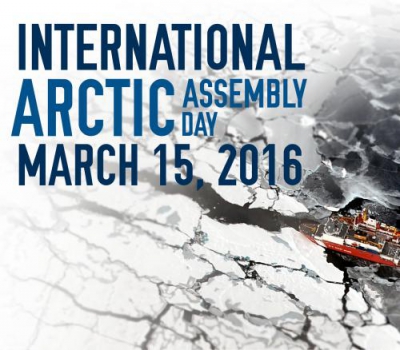By: Kristin Timm, International Arctic Research Center, University of Alaska Fairbanks

Scientists, indigenous people, government officials and other people interested in the Arctic are invited to participate in the first International Arctic Assembly at the University of Alaska Fairbanks (UAF) on Tuesday, 15 March 2016. The one-day event will be held at the UAF Davis Concert Hall and streamed online. It will harness the expertise of high-level officials attending the Arctic Science Summit Week, Arctic Observing Summit, and the Arctic Council's Senior Arctic Officials Meeting to examine how the research community, the people of the Arctic, and the policy community can work together to better respond to a rapidly changing Arctic.
"It will be a wonderful opportunity to hear the visionary perspectives of those who are helping to guide our nations in addressing the challenges of a rapidly changing Arctic," said Larry Hinzman, UAF Vice Chancellor for Research and International Arctic Assembly coordinator. The meeting comes at a time when increased tourism, shipping, resource extraction, and other commercial and military activities in the Arctic are creating opportunities and challenges for state, national, and international governing bodies. Information to make policy decisions is often in demand in these situations, but the connection between research and policy is far from a straight line and often includes significant obstacles.
Beginning at 8:15 a.m. (Alaska Daylight Time), the program for the day includes several short presentations, moderated panels, and opportunities for questions and discussions with in-person and remote audiences.
The morning session will be moderated by Byron Mallott, Lieutenant Governor of Alaska, and will open with four keynote speakers who will broadly examine the intersection of science and policy from different perspectives:
- Ambassador David Balton (Deputy Assistant Secretary for Oceans and Fisheries in the Bureau of Oceans and International Environmental and Scientific Affairs, U.S. Department of State), who coordinates the development of U.S. foreign policy concerning oceans, fisheries, and the polar regions;
- Inuuteq Holm Olsen (Minister Plenipotentiary at the Greenland Representation at the Danish Embassy in Washington, D.C.), who manages Greenland's foreign affairs related to Arctic and Nordic policies;
- David M. Kennedy (Deputy Under Secretary for Operations at the National Oceanic and Atmospheric Administration (NOAA)), who provides day-to-day management of NOAA's national and international research operations, and has led the federal scientific response to the Exxon Valdez oil spill and other incidents; and
- Marcus Carson (senior research fellow at the Stockholm Environment Institute), who studies social change processes with an emphasis on the social and political drivers and obstacles involved in developing policy responses to climate change in the U.S. and the European Union.
The keynote speakers will be followed by select international research program directors and Arctic Council Working Group and Task Force leaders who will discuss current collaborative structures and recent scientific contributions used to address some recent Arctic challenges and opportunities. Distinguished speakers include Julia Gourley, U.S. Senior Arctic Official; Ulrik Westman, Chair of the Swedish Environmental Protection Agency; and Tara Sweeney, Chair of the Arctic Economic Council.
The International Arctic Assembly will conclude with a dialog about the future role of scientific research in decision-making, policy, industry, security, and environmental stewardship in the Arctic. Speakers, panelists, and conference participants will be challenged to find innovative approaches to collaboratively respond to opportunities and challenges that emerge from a rapidly changing Arctic. Ambassador Mark Brzezinski, Executive Director of the U.S. Arctic Executive Steering Committee, will provide the closing remarks.
Broad participation is encouraged for the International Arctic Assembly, and a one-day registration option is available for anyone who would like to attend. The International Arctic Assembly is included with registration for the Arctic Observing Summit and the Arctic Science Summit Week. Registration includes the conference program, lunch, breaks, and an unprecedented opportunity to network with international Arctic leaders in science and policy. Online registration is available through Tuesday, 1 March. On-site registration will be available at the University of Alaska Fairbanks Wood Center beginning at 7:00 a.m. (Alaska Standard Time) on Saturday, 12 March 2016 or on the morning of the event.
The day will conclude with a banquet at the Carlson Center in Fairbanks to celebrate the Arctic and international cooperation through cultural performances, remarks from Arctic leaders, and a meal featuring many Alaskan foods. Banquet tickets can be purchased online here or at the door, while supplies last.
The International Arctic Assembly Day will be live-streamed from the Arctic Science Summit website. Discussion and questions will be encouraged from online participants and via twitter using the hash tag #ASSW2016.
The full agenda for the International Arctic Assembly is available online here.
